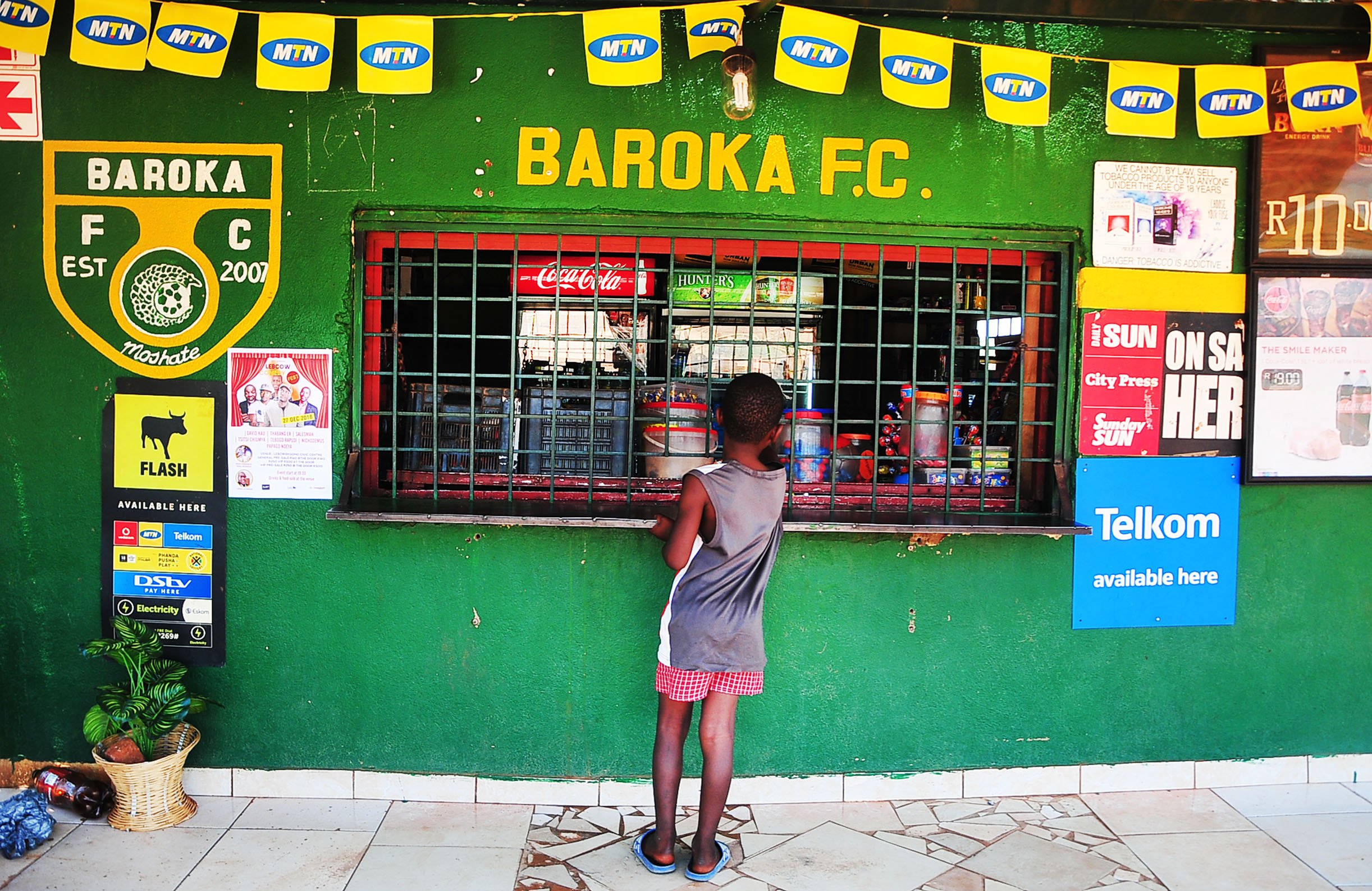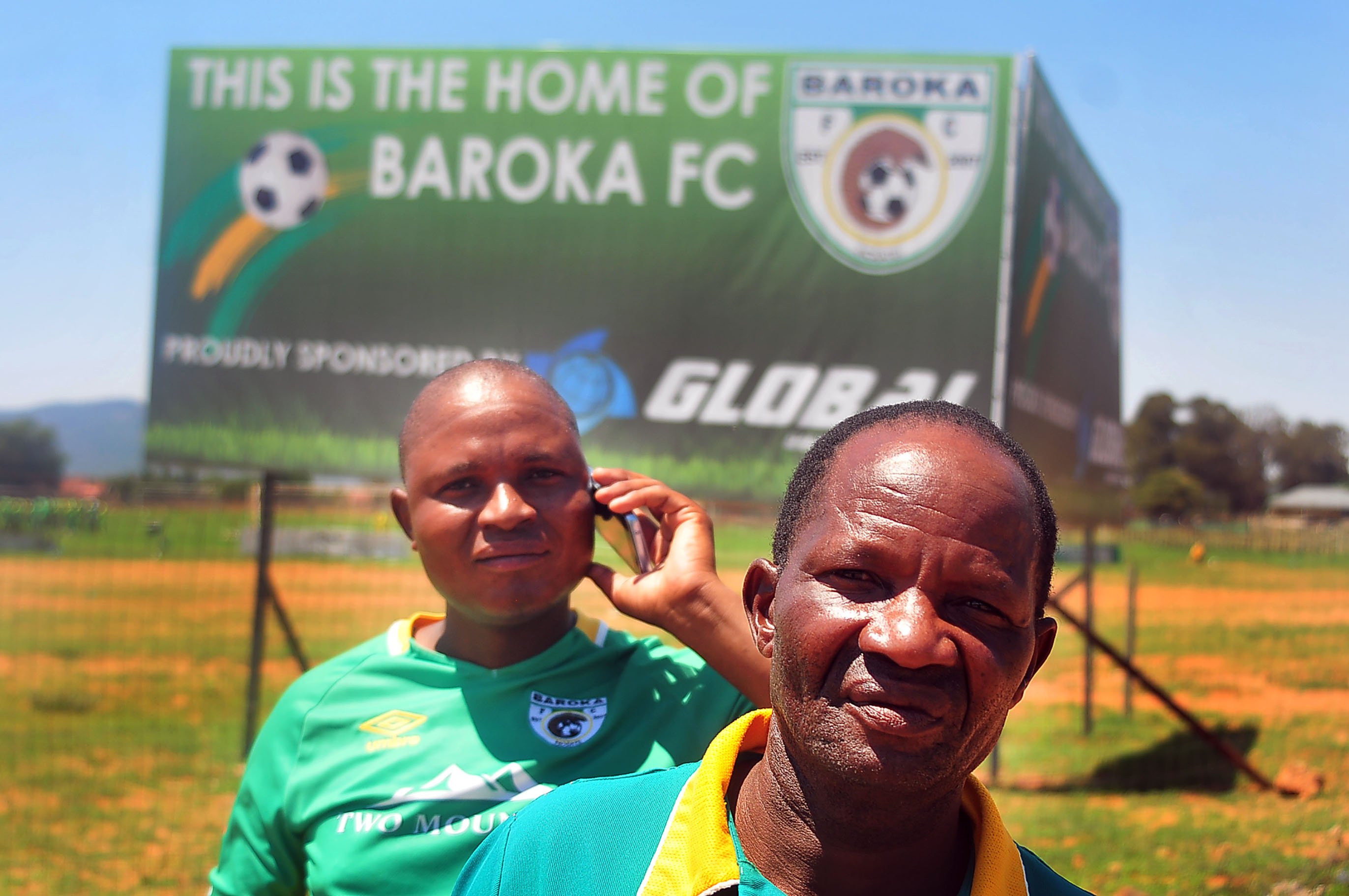Maredi believes Barokas rise to the top league has not only given fans like him something to be proud of but has also inspired the youth to believe they too can take on the world and win regardless of their surroundings. (Lucas Ledwaba/M&G)
Young Emmanuel Chidi takes his teammates through their paces on the sandy village pitch in the late morning heat of Limpopo.
The youngsters from Hot Beans, an amateur football club in Mashite, a sub-village of Ga-Mphahlele are in high spirits.
FC Baroka, which is based at Seleteng, a village just half an hours walk from their training ground has proven yet again that coming from a rural village doesn’t stop anyone from reaching the top.
Baroka defied the odds when they beat favourites Orlando Pirates 3-2 after a penalty shootout in the Telkom Knockout Cup Final last Saturday. The club’s management is now preparing the mother-of-all parties for its fans in Ga-Mphahlele on Monday.
But the impact of Baroka’s feat against the former African champions from glitzy Joburg will continue to be felt in this rural backwater long after Monday’s festivities, especially among young aspirant footballers such as Chidi.
“It [the victory] has given us confidence that we can also go far. They beat a big team, something we never imagined was possible,” says Chidi, dressed in an old FC Baroka top.
Hot Beans are preparing for an annual top 16 knockout tournament to be hosted at their ground during the holiday season. But unlike their professional neighbours FC Baroka, who won R4-million in prize money, the youngsters will be vying for an R8 500 stake.
Football remains one of the major forms of recreation in areas like Ga-Mphahlele. It is played on sandy and sometimes rocky grounds barricaded with mielie sacks sewn up together, a distant world to the world-class stadiums their seniors play on.
Spectators are charged small fees from R5 to R10 which goes towards contributing to the prize money. Hawkers make some money selling ice lollies, cool drink, fruit, beer and food to fans who flock to these matches.
With a dire lack of resources from transportation to proper playing kit and fields, many of the clubs prefer these cash stake matches to organised league football which offers very little or nothing in monetary returns.
Such is their love for the game that sometimes players go to great lengths to raise money to affiliate in these tournaments, offering their labour to plough fields for individual families and in some cases even doing odd jobs such as digging pit toilets.
This is the price the youngsters are prepared to pay to fulfil their dreams of making it to the paid ranks one day, hopefully in the colours of Baroka.
Ga-Mphahlele falls under the Nkumpi Lepelle Municipality of Limpopo, which according to the 2011 Census by Stats SA has an unemployment rate of 48.1% and youth unemployment rate of 62.4% with a dependency ratio of 77.9%.
 (Lucas Ledwaba/M&G)
(Lucas Ledwaba/M&G)
The Hot Beans players like many of the people from Ga-Mphahlele sometimes walk to the Ngwana Mohube training ground to watch Baroka train. There they gain inspiration and learn first-hand some of the training tips applied by their heroes.
“We are proud of them [Baroka]. Their win proves that we have a strong culture of football here in Ga-Mphahlele,” says Sticks Kgomoeswana, who helps out with coaching and managing the Hot Beans boys who, even without a proper football or kit, still display much dedication and passion for the beautiful game.
One of the jewels to come out of Ga-Mphahlele is Kaizer Chiefs senior player and Bafana Bafana defender Ramahlwe Mphahlele, who hails from Dithabaneng.
“Many of us have the burning desire to play at that high level. It is tough being in a village. But we know it is not impossible,” says Sticks.
While the boys rest under the shade of a massive morula tree to discuss the Baroka victory and the upcoming tournament, elsewhere coach Wedson Nyirenda takes the newly crowned champs through a brief session.
Sedibane Molaba and his colleagues sit on the back of a bakkie at Ngwana Mohube grounds watching the training session.
Molaba, like many of the club’s fans who live in Seleteng hardly miss a training session.
“I’m here every day. I love this club. I think by coming here every day we supporters encourage the players,” he says.
As we speak a white Mercedes Benz light commercial van drives slowly through the gates towards the training field which is visible from the road. An air of excitement sweeps through the men seated on the bakkie.
“Ke Ngwato naa?” one of them asks.
The others nod and wave warmly at the man behind the wheel.
“That’s our chairman [Khurishi Mphahlele],” says Molaba.
He attributes Baroka’s speedy progress, moving from the Vodacom League to the First Division and then the Absa Premier League in just under a decade since it was founded in 2007 to the understanding between management and the fans.
“The chairman listens to us. We, as supporters, can sit down with management and share ideas. That really makes us feel part of the team,” says Molaba, a member of the club’s Seleteng branch.
Baroka’s ascension to the elite league has instilled a sense of pride in many football lovers like Molaba who upon the club’s founding, switched allegiance from Orlando Pirates.
“If you are looking after someone’s cattle and then one day your own family bought its own, then you will come back home to look after your own,” he explains his decision.
He could not attend the club’s maiden cup final in Port Elizabeth last week because his daughter was getting married. But after the game, he drove to the club’s training ground to celebrate with other village residents. The following day, Sunday, they returned to the ground to continue the celebrations while awaiting the return of their heroes.
“I haven’t taken off my club shirt since that night. I even go to bed in it,” says Molaba.
Magoro Maredi, also dressed in a Baroka shirt is still on cloud nine after returning from the trip to Port Elizabeth.
 (Lucas Ledwaba/M&G)
(Lucas Ledwaba/M&G)
The deputy chairperson of the Sefalaolo supporters branch says he supported the club when it was still known as Giant Killers in the amateur ranks up to now. He took along four Baroka shirts on the long trip to the Eastern Cape coastal city, where the fans bathed in the ocean ahead of the big clash “to wash away bad luck”.
“When Pirates scored the second equaliser I went down and prayed. And then when Lorch missed his penalty we all idibala,” says Maredi, explaining how the supporters feinted a faint as part of the latest craze from King Monada’s hit song Malwedhe.
“We never slept for two days. We were just too happy,” he says.
Maredi believes Baroka’s rise to the top league has not only given fans like him something to be proud of but has also inspired the youth to believe they too can take on the world and win regardless of their surroundings.
“The youth did not take football seriously before Baroka made it to the PSL. Now they do, and this win will ensure they know it is possible for them to go far.” – Mukurukuru Media